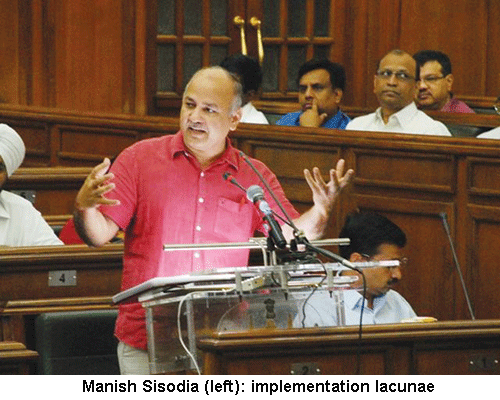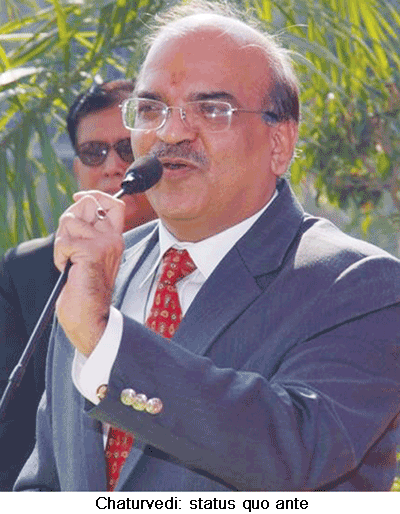 If for little else, the aam aadmi Party (AAP) government of Delhi state, led by former social activist-turned-politician Arvind Kejriwal, has to be credited with moving education to the top of its development agenda. For three consecutive years since 2015 — when it was unexpectedly swept to power routing the Bharatiya Janata Party fresh from its General Election 2014 triumph — the AAP government has been allocating a rising share (Rs.9,836 crore in 2015 and Rs.10,600 crore in 2016) of the state’s annual budgetary expenditure to education. This year as well, deputy chief, finance and education minister Manish Sisodia, presenting the 2017-18 budget, announced an allocation of Rs.11,300 crore for education (including Rs.1,114 crore on the capital account) — equivalent to 23.5 percent of the total Rs.48,000 crore budget of the state government.
If for little else, the aam aadmi Party (AAP) government of Delhi state, led by former social activist-turned-politician Arvind Kejriwal, has to be credited with moving education to the top of its development agenda. For three consecutive years since 2015 — when it was unexpectedly swept to power routing the Bharatiya Janata Party fresh from its General Election 2014 triumph — the AAP government has been allocating a rising share (Rs.9,836 crore in 2015 and Rs.10,600 crore in 2016) of the state’s annual budgetary expenditure to education. This year as well, deputy chief, finance and education minister Manish Sisodia, presenting the 2017-18 budget, announced an allocation of Rs.11,300 crore for education (including Rs.1,114 crore on the capital account) — equivalent to 23.5 percent of the total Rs.48,000 crore budget of the state government.
Major highlights of AAP’s education budget for 2017-18 are: establishment of libraries in 400 government secondary schools and a special library for each classroom of primaries (Rs.417 crore); setting up ten early childhood education centres for children in the two-six years age group (Rs.4 crore); introduction of pre-primary education in 156 government schools; and plans to promote five Schools of Excellence with English as the medium of instruction. In his March 8 budget presentation speech, Sisodia also announced setting up of two new District Institutes of Education and Training (DIETs) to add to the nine currently, and a high quality Teacher Training Institute affiliated with the city’s Ambedkar University to address the crisis of chronic teacher shortage. Currently, there are over 26,000 teacher vacancies in 1,977 municipal and state government schools with the average teacher-pupil ratio nearing 1:80.
But with the AAP administration, despite its good intentions, unable to deliver its promises of the past two years, monitors of the national capital region’s education scene are losing faith. “While the AAP government needs to be lauded for prioritising education in its budgets, policy formulation and implementation is very unsatisfactory. For instance, instead of promoting new playgroup and pre-primary schools, it should have expanded and improved Delhi’s cash-starved anganwadis. Also, certain initiatives such as distributing electronic tablets is an unnecessary expenditure. The money could have been used elsewhere,” says Ambarish Rai, convenor of the Delhi-based RTE Forum, a network of 10,000 civil society groups working on effective implementation of the Right of Children to Free and Compulsory Education (RTE) Act, 2009.
Rai’s charge of inefficient and misplaced expenditure is not unwarranted. Many promises for education upliftment made in AAP’s first budget of 2015 remain unfulfilled. It promised 500 new greenfield schools which are still on the drawing board, because land has not been purchased/leased yet. Construction of 8,000 classrooms has been vigorously advertised by the government as its great achievement. But most of these classrooms are without teachers, given that there are 26,000 teacher vacancies in state government schools. No new college has been established in Delhi despite AAP’s election manifesto promise, and even its commitment of enabling 28 fully and partially aided colleges with wi-fi connectivity remains on paper.
Though to its credit, the AAP leadership has understood the importance of primary-secondary education, it hasn’t been able to translate good intentions and lofty promises into effective ground-level policies and projects. “The need is to improve the learning outcomes of all students by developing child-centric policies. This can be done by adopting the charter model under which government schools are run by NGOs or educationists with proven track records. Simultaneously, the state government can adopt the well-known voucher scheme under which students can be given cash vouchers to pay for private or charter schools of their choice,” says Amit Chandra, associate director (policy advisory) of the Centre for Civil Society, the Delhi-based think tank which champions education causes and the school vouchers scheme in particular.
Half-way through its term, it’s time Kejriwal and the AAP leadership became aware that noble intentions need to be backed up by projects implementation on the ground. Sine qua non.
Swati Roy (Delhi)
Stress is back!
 The delhi-based central board of Secondary Education (CBSE) — the country’s largest national school-leaving examinations board which has 18,688 schools in India and abroad affiliated with it — has restored the class X exam, made optional by it in 2010 at the behest of former Union HRD minister Kapil Sibal, and has made it compulsory for all CBSE schools from the new academic year 2017-18 beginning in June/July.
The delhi-based central board of Secondary Education (CBSE) — the country’s largest national school-leaving examinations board which has 18,688 schools in India and abroad affiliated with it — has restored the class X exam, made optional by it in 2010 at the behest of former Union HRD minister Kapil Sibal, and has made it compulsory for all CBSE schools from the new academic year 2017-18 beginning in June/July.
Therefore to all intents and purposes, it has also abolished the current continuous and comprehensive evaluation (CCE) assessment scheme which was made mandatory for upper primary classes (VI-VIII) in 2009. In a circular dated March 21, 2017, CBSE chairman R.K. Chaturvedi, directed all affiliated schools to follow the new directive in toto. Schools have also been asked to issue report cards (aka marks sheets) in the prescribed format provided with the circular.
Under the new schema, children in classes VI-VIII will write two half-yearly term exams annually. The weightage given to written exams will be 80 percent with 10 percent accorded to class tests performance, 5 percent to notebook submission (homework) and 5 percent to subject enrichment (specific project work). Significantly, in a departure from past practice, to enable students to retain what they have learned, 10-30 percent of the first term syllabuses of classes VI-VIII will be re-tested in second term exams while class IX students will write a full-fledged exam in preparation for the mandatory class X board exam. Co-scholastic education and discipline will be assessed in three categories — outstanding, very good and fair.
The CBSE management under Chaturvedi, who was appointed chairman of this pan-India exams board under the purview of the Union HRD ministry, in 2016, has come under fire for unwarranted interference with the administration of affiliated private independent schools (see EW February cover story ‘Brewing revolt against control and command CBSE’). The March 21 circular also limits the freedom of teachers, by asking them to choose mathematics, science and social science project assignments from the CBSE website and NCERT textbooks, stating this is necessary to boost student confidence and ease student transfers between ever-growing CBSE-affiliated schools.
Eminent educationist and a well-known proponent of CCE, Prof. Anita Rampal of Delhi University, describes this reversion to the pre-RTE Act exams system as regressive, and accuses CBSE of exceeding its mandate. “CBSE is a secondary exams board with no role in upper primary education and assessment. Primary and upper primary education falls within the purview of NCERT and the SCERTs in the states. The National Curriculum Framework (NCF) of NCERT and the RTE Act explicitly state that continuous assessment of children’s progress is necessary and CCE required teachers to closely monitor students, and continuously assess them,” says Rampal. “Instead of making learning exploratory, inquisitive, innovative and joyful as envisaged by NCF and the RTE Act, the board has gone back to the examination system which is a clear divergence from the spirit of the RTE Act,” she adds.
Nevertheless, teachers and school managements have welcomed the March 21 circular restoring the status quo ante, as CCE had become an imposition and involved considerable paperwork. “We welcome restoration of the previous exams system because CCE had become a burden for teachers and resulted in grades inflation with too many school managements awarding 100 percent to their students. This new scheme is simpler and easier to implement,” says Cdr. V.K. Banga, chairman of IPSC (Indian Public Schools’ Conference) and principal of the CBSE-affiliated Mann School, Delhi.
Back to square one and sudden-death exams!
Autar Nehru (Delhi)